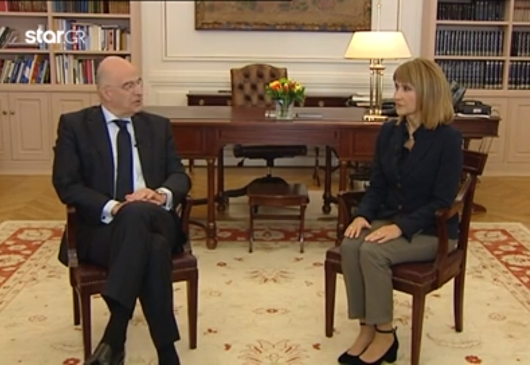 JOURNALIST: Minister, let’s start with the incident we had early this morning in Kos, where, from what we see in the video, a Turkish coastguard vessel intentionally rammed a Greek coastguard vessel. An initial comment on this, and whether you, as the Minister of Foreign Affairs, are thinking of making a demarche to Ankara.
JOURNALIST: Minister, let’s start with the incident we had early this morning in Kos, where, from what we see in the video, a Turkish coastguard vessel intentionally rammed a Greek coastguard vessel. An initial comment on this, and whether you, as the Minister of Foreign Affairs, are thinking of making a demarche to Ankara.
N. DENDIAS: First of all, the incident is unacceptable, because it is obvious that it wasn’t a random occurrence. The contact between the two vessels wasn't an accident. It is obvious that the Turkish coastguard vessel intentionally rammed the Greek vessel. This afternoon, the Secretary General of the Ministry of Foreign Affairs summoned the Turkish Ambassador, and the appropriate representations will be made. But I want to be clear: we read Turkey’s provocative conduct as an effort to drag Greece onto this path. We have no intention of following Turkey’s lead.
JOURNALIST: Now, we've seen the Prime Minister's meetings abroad in recent days, and we’ve seen Tayyip Erdogan, who didn’t get any of the things he asked for from the Europeans. How do you read this situation? Will Turkey escalate the tension on our sea borders and in Evros?
N. DENDIAS: I think President Erdogan did not read Europe very well in this effort. He went with a list of demands which he thought would be satisfied as a counterweight to his obligations on the migration issue. Europe doesn't work like that. President Erdogan has often misread things. It is obvious that a likely Turkish reaction would be an attempt to escalate the tensions in Greek-Turkish relations. We expect this, but I repeat that we will not be dragged onto this path. Our path is the path of Law and reason – this is how Greece promotes its positions. We won’t change the playing field.
JOURNALIST: But how will we endure the pressure from Turkey, because we saw the incident in Evros the day before yesterday, when a Turkish commando fired a shot straight at the Greek side? The army is at the border, the police are at the border, but how will we stand up under this constant pressure?
N. DENDIAS: Allow me to say that we haven’t done too badly so far. In spite of the many attempts that have been made in various ways – willingly or unwillingly, in various places – to provoke an incident, I think the Greek side has done extremely well. I think the Armed Forces, the Police and the Coast Guard have shown a high level of professionalism, and this is how we have to handle things. If you ask me if this is pleasant, I’ll respond that it is not at all pleasant. It is extremely annoying – and of course it is a very risky situation. But it is our duty to remain committed to what is in the national and European interest.
JOURNALIST: Mr. Stefanis talked about a war without bullets. Is this your reading: that our country is dealing with a hybrid war?
N. DENDIAS: That’s a very highly charged word. So, in my capacity as Minister of Foreign Affairs, I would avoid using it. But I think it is obvious that there is a campaign of provocations against our country and against Europe, and there would be no point in denying that.
JOURNALIST: And one last question. Over the past 48 hours, fears over the coronavirus have increased a great deal. Are you concerned about this in terms of the migration issue? For example, a case in Moria or Vial?
N. DENDIAS: I don’t handle the migration issue. But I am certain that the competent officials will take all the necessary measures and have all the planning in place to deal with this. Now, if you ask me whether this is extremely difficult, it obviously is. But what can we do? We have to adapt and face the challenge.
JOURNALIST: Thank you.
N. DENDIAS: Thank you.
March 11, 2020


